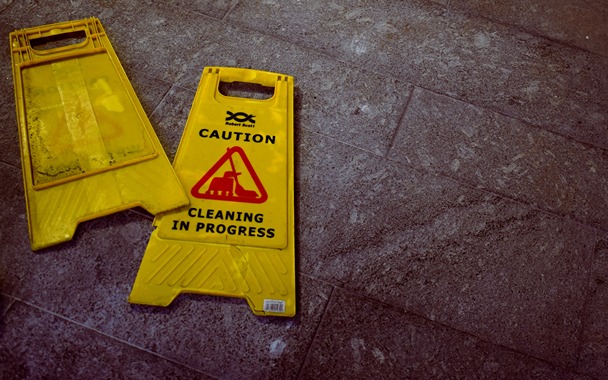
If you fall and injure yourself on another person’s property, you may be entitled to recover compensation by filing a slip and fall lawsuit. California slip and fall cases fall under the state’s premises liability laws.
Although the law provides a way by which you can recover damages, it also requires claimants to follow strict evidentiary and procedural rules.
It is essential that you take steps to protect your rights and remedies by documenting your slip and fall and contacting an experienced attorney.
Slip and Fall Lawsuits
Under California Civil Code §1714(a), property owners and occupiers must do the following:
- Exhibit reasonable care to maintain safe conditions on their property, and
- Prevent foreseeable injury to others who come onto their premises.
The duty of care includes:
- Maintaining the property,
- Regularly inspecting the property,
- Warning guests of hazards, and
- Repairing potentially dangerous conditions.
Owners who fail to meet this standard may be liable for the injury victim’s damages.
On the other hand, the law requires that injury victims meet their burden of proof to establish that the property owner was negligent. In most cases, the injured party must prove the following:
- The property had a dangerous condition that created an unreasonable risk of harm;
- The property owner or occupier was aware of the hazard; and
- The property owner failed to repair, protect against, or warn visitors of the dangerous conditions.
The average payout for a slip and fall injury largely depends on whether the victim met their burden of proof and if their evidence supports their claim for damages.
An experienced California slip and fall lawyer can help you identify the full extent of your damages to ensure you are fairly compensated for your injuries.
What to Do After a Slip and Fall
Understanding what to do and what not to do after a slip and fall accident is crucial to securing the compensation you need to recover for your injuries and related damages.
Steps To Take After a California Slip and Fall
Taking the following steps after you suffer injuries at a private residence, business, or another location can help substantiate your claims for damages. The steps include:
- Reporting your slip and fall to the property owner, manager, or landlord;
- Seeking medical treatment by calling 911 or going to the emergency department;
- Documenting your slip and fall by taking photos of the scene and your injuries;
- Gathering eyewitness contact information; and
- Calling an experienced California premises liability lawyer.
These actions can prevent future harm and increase the likelihood of a favorable slip and fall settlement.
Things to Avoid After a Slip and Fall Accident
In properly documenting your slip and fall, there are a few actions you should generally avoid unless and until you speak with an experienced personal injury attorney:
- Speaking to representatives of the business or property owner except to report injuries,
- Admitting fault,
- Talking to private investigators or insurance adjusters,
- Accepting cash settlements,
- Signing any waivers or releases without the advice of an attorney,
- Discussing your injuries or the accident on social media,
- Missing doctor’s appointments or treatments, and
- Ignoring, minimizing, or disregarding signs of injury.
As with many other accidents, the extent of slip and fall injuries can be masked by adrenaline and other factors. Thus, many people ignore the signs of injury until it is too late. Contacting an attorney and addressing the extent of your injuries and damages can help you secure maximum compensation for your accident.
Most California slip and fall lawyers accept cases on a contingency basis, meaning there is no risk in calling to schedule a consultation.
Necessary Evidence in Slip and Fall Cases
Documenting your accident and subsequent injuries will significantly affect your slip and fall lawsuit. Some vital evidence in a California slip and fall accident includes the following:
- Date-stamped photos and videos,
- Written accounts of your injuries,
- Witness testimony, and
- Property or business records.
This evidence can establish fault, support a claim for damages, and refute comparative negligence claims against the injury victim.
Compensation for Slip and Fall Damages
California slip and fall victims may be entitled to economic and non-economic damages. These damages include compensation for the following:
- Medical expenses,
- Lost wages,
- Lost earning capacity,
- Property damage,
- Pain and suffering, and
- Loss of consortium.
In very rare cases, the injury victim may be entitled to punitive damages. This type of award is limited to situations involving particularly egregious conduct or gross negligence.
Average Payout for a Slip and Fall Injury
There is no average payout for a slip and fall injury because these cases are highly fact-specific. However, an attorney can help you understand what you can reasonably demand and expect to receive following a settlement or trial.
Speak with an Injury Lawyer for Slip and Fall Cases Today
If you recently slipped and fell while on another’s property, the dedicated injury lawyers at Weinberg Law Offices are here to help. We understand the immediate impact of a serious injury on your life.
We tailor our representation to the specific and unique needs of each of our clients. We start with a free and confidential consultation, during which we will listen to what happened, provide you with an overview of the recovery process, and explain what we can do to help.
If you decide to bring us on board, we will work tirelessly to connect you with the compensation you deserve. To learn more, and to schedule a free consultation today, give us a call at 866-341-9476. You can also connect with us through our online contact form.
Disclaimer: This content should not be construed as legal advice.
